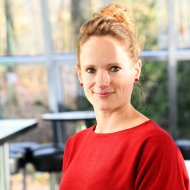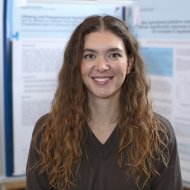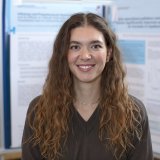Voices of REDDIE
Get to know different members in this interview series

Safoora Gharibzadeh
Leicester Diabetes Centre
Safoora Gharibzadeh

Institution/Lab
Leicester Diabetes Centre
Position/Role
Research Fellow
Major Fields of Research/Activity
Medical Statistics
Share this Interview
www.reddie-diabetes.eu/partners#safoora-gharibzadeh
What is your role in the REDDIE team at your institution?
I serve as a senior statistician within the REDDIE team at my institution. My responsibilities encompass implementing advanced statistical methodologies and interpreting results to inform decision-making processes. This role allows me to leverage my extensive experience in statistical analysis to contribute effectively to the objectives of the REDDIE team.
What are you currently working on within the scope of REDDIE and what are your main goals and objectives in the project?
As a member of the Real-world Evidence unit within the REDDIE team, I am actively engaged in projects that leverage data from electronic health records and routinely collected data. Our unit operates within the Leicester Diabetes Centre, where our primary focus is on diabetes research. Currently, I am spearheading projects that delve into various aspects of diabetes, including treatment effectiveness, behavioural interventions, and factors influencing outcomes such as diabetic foot ulcers and Major Adverse Cardiovascular Events (MACE), with a particular emphasis on ethnic disparities. Through meticulous data analysis and interpretation, my goal is to contribute valuable insights that can enhance our understanding of diabetes and inform evidence-based practices for improved patient outcomes.
What are some of the most interesting findings or insights that you have gained or are expecting to gain from your research in REDDIE?
Being part of an international project within REDDIE has been an enriching experience, exposing me to diverse diabetes registries across different countries. The collaborative nature of our work, involving regular meetings for various work packages, has provided me with a holistic view of diabetes research. One aspect I find particularly intriguing is our focus on Work Package 4 (WS4), where we aim to uncover gaps between randomised controlled trials (RCTs) and real-world data.
This specific focus is crucial for clinical practice, as understanding these gaps can significantly impact the improvement of treatments for patients with diabetes and its complications. As we anticipate the results from WS4, I am eager to unveil insights that could pave the way for more effective and personalized approaches in diabetes care. This experience has underscored the immense potential of large, collaborative teams in advancing our understanding of diabetes and its implications for clinical practice.
What makes working on the REDDIE project special for you personally?
Working on the REDDIE project holds a special place for me both professionally and personally. Being part of a team composed of highly skilled statisticians, clinicians, health economists, and regulators has been an invaluable experience. The collaborative and interdisciplinary nature of our group has not only enriched my professional growth but has also provided a unique environment for learning and innovation.
On a personal level, my connection to the project is deeply rooted in the fact that both of my parents live with diabetes. This personal experience fuels my passion for contributing to the field and underscores the significance of our work. If I can play a role, no matter how small, in making the journey for my parents and other individuals living with diabetes more manageable, it would be a gratifying achievement. This dual perspective, blending professional expertise with a personal connection to the cause, adds a profound layer of meaning to my involvement in the REDDIE project.
How do you see using real-world data to impact diabetes care in the future?
As we look to the future of diabetes care, the utilisation of real-world data emerges as a pivotal factor in addressing the limitations inherent in randomised controlled trials (RCTs). While RCTs provide valuable insights into the efficacy of medications and treatments, they often operate in controlled settings that may not fully represent the complexities of routine medical practice.
Real-world data, drawn from diverse patient populations in everyday clinical settings, offers a unique perspective on the true effectiveness and impacts of interventions. By incorporating these insights, clinicians can make more informed decisions tailored to the nuances of individual patient experiences. Furthermore, well-designed research using real-world data has the potential to uncover patterns, trends, and treatment responses that may go unnoticed in traditional trial settings.
In essence, the future of diabetes care hinges on our ability to bridge the gap between controlled trials and real-world scenarios. This integration not only enhances the evidence base for clinicians but also holds the promise of delivering more personalized and effective treatments to individuals living with diabetes
What would you perfect day look like?
My perfect day would begin with the crisp morning air as I stroll through the serene beauty of “Brocks Hill”, accompanied by the comforting aroma of my favourite coffee. The peaceful surroundings and the gentle sounds of nature set the perfect tone for a reflective and invigorating start. As the day unfolds, I find joy in various activities, but it invariably concludes with a sense of relaxation.
In the evening, I indulge in the simple pleasure of lazying around and watching Netflix. Whether it's immersing myself in a gripping series or enjoying a light-hearted movie, the leisurely hours spent unwinding allow me to escape into captivating stories. It's the ideal way to unwind and recharge, bringing a perfect balance to the day. This blend of tranquillity, nature, and entertainment creates a harmonious symphony, making each moment memorable and fulfilling.

Monika Cigler
Medical University of Graz
Monika Cigler

Institution/Lab
Medical University of Graz
Position/Role
Vice-coordinator of the REDDIE project, researcher
Major Fields of Research/Activity
Diabetes technology, Hypoglycaemia, Real World data
Share this Interview
www.reddie-diabetes.eu/partners#monika-cigler
What is your role in the REDDIE team at your institution?
I am the vice-coordinator of the REDDIE project.
What are you currently working on within the scope of REDDIE and what are your main goals and objectives in the project?
We are halfway through the third year of the project, so now my focus shifts more towards the guidelines for using real-world data in research. My goal in this project is to do something useful for society – as soon as we have good quality standards for real-world data and can use them more efficiently in medicine, processes like drug approval (and many others) will be sped up immensely, which, in turn, will help hundreds of thousands of people. So you can somehow say, my goal is to save the world. Also, I want to practice project coordination – I like this work!
What are some of the most interesting findings or insights that you have gained or are expecting to gain from your research in REDDIE?
If I knew in advance, the findings would not be interesting any more! Wait until the end of REDDIE!
What makes working on the REDDIE project special for you personally?
Before I started this and my last project, I knew all the high-end researchers and world leaders in the fields of diabetes and real-world data only from conferences and papers – they were like gods, far away and unreachable. And suddenly, you are right amongst them, sending them e-mails every day, calling them by their first names, working together, and playing table tennis with them after a long weekend of hard work!
How do you see using real-world data to impact diabetes care in the future?
I think it already is revolutionising diabetes care now, as we absolutely need data from the patients’ everyday lives! Through these data, you get to know what the problems of old people living with diabetes, of children, of people with comorbidities really are – these people often do not meet the inclusion criteria of randomised controlled studies, hence, we do not know enough about them.
Do you have any hidden talents?
I have a hidden talent which – to tell you the truth – is good for absolutely NOTHING: I can type faster in Japanese on a computer than most Japanese can.

Puriya Daniel Würtz Yazdanfard
University of Copenhagen / Nordsjællands Hospital
Puriya Daniel Würtz Yazdanfard

Institution/Lab
University of Copenhagen / Nordsjællands Hospital
Position/Role
M.D, PhD Fellow
Major Fields of Research/Activity
Diabetology and Cardiology
Share this Interview
www.reddie-diabetes.eu/partners#puriya-daniel-wurtz-yazdanfard
What is your role in the REDDIE team at your institution?
As a Medical Doctor and PhD fellow my role in the REDDIE team lies within several areas. Firstly, I support the project by giving medical insight to the team. I also help with conceptualisation and writing of analysis plans. Moreover, I do data management in R and perform statistical analysis for various projects. Finally, I contribute by writing and editing scientific papers, which is used to convey our results.
What are you currently working on within the scope of REDDIE and what are your main goals and objectives in the project?
Currently, we are working on using the Danish nationwide registries to emulate some of the leading diabetes trials. These trials included the big GLP-1 and SGLT2i trials which truly helped propagate treatment and management of type 2 diabetes forward. We do this by employing novel but tested statistical and machine-learning methods. Our primary goal is to recreate these landmark diabetes trials as closely as possible with real-world data.
What are some of the most interesting findings or insights that you have gained or are expecting to gain from your research in REDDIE?
So far our initial results convey that these methods (longitudinal targeted maximum likelihood estimation) work with interpretable and useful results. We are ready to roll these methods out on various target trials. Some of the most interesting findings for us is to actually observe and further emphasise that these diabetes medications are highly effective in a real-world setting outside a controlled trial environment.
What makes working on the REDDIE project special for you personally?
Personally, I enjoy the collaborative aspect of the project both locally within our unit in Copenhagen and also more broadly among the EU REDDIE members. I believe this cooperation strengthens our findings within the work package and is key to success. Additionally, I enjoy being at the forefront regarding these new methodologies and have an interest in the programming aspect.
How do you see using real-world data to impact diabetes care in the future?
Real-world data plays a central role when it comes to post-exposure monitoring and evaluating therapies in a real-world setting. Additionally, it allows for more subgroup studies. In the specific case of REDDIE, we aim for regulatory authorities to be able to use our findings for evaluating diabetes medications after market release.
What do you do when you're not working?
One thing I enjoy doing is spending time cooking at home. Part of that involves developing new recipes which involve the fusion of known cuisines. An example could be dishes that have traits from the Japanese and Italian kitchens. When we remodelled our house making an ideal kitchen was a high priority, due to the abovementioned.

Carmen Hurtado
Breakthrough T1D
Carmen Hurtado

Institution/Lab
Breakthrough T1D
Position/Role
Scientist
Major Fields of Research/Activity
Type 1 Diabetes
Share this Interview
www.reddie-diabetes.eu/partners#carmen-hurtado
What is your role in the REDDIE team at your institution?
My main role is to understand the patient perspectives on the use of RWE to assist clinical decision-making, inform regulatory choices, and value evaluations in diabetes research.
What are you currently working on within the scope of REDDIE and what are your main goals and objectives in the project?
We have established the REDDIE’s Patient Advisory Committee (PAC). Our experience at Breakthrough T1D has shown that people living with diabetes are interested in participating in and contributing to health and social care research for a variety of reasons. Most importantly, they not only want to profit from additional treatments, but they also want to assist others who are living with the same ailment as they are. The main PAC’s goal is to gather patient-community views on RWE and related concerns as well as the tools needed by patients to understand, trust, and use RWE.
What are some of the most interesting findings or insights that you have gained or are expecting to gain from your research in REDDIE?
I am expecting to find a set of best practices and lessons learned of how patients are engaged with RWE generation for medical device or device and drug combination evaluation. I, together with the PAC, would also like to identify evidence gaps for future investigation in Diabetes.
What makes working on the REDDIE project special for you personally?
Personally, I believe REDDIE is a unique project to work on if you are interested in Diabetes Research. The insights from REDDIE will play a crucial role in drug development, healthcare policy-making and improving patient outcomes for people living with Diabetes.
How do you see using real-world data to impact diabetes care in the future?
RWE research is pivotal in bridging the gap between clinical research and everyday healthcare. The use of RWE will impact diabetes care diabetes offering a more comprehensive view of treatment effectiveness, paving the way for personalized and effective care.
If you could have lunch with anyone, who would it be?
I would love to have lunch with Katalin Karikó

Martina Radanović
Research and Innovation Services - RISE d.o.o.
Martina Radanović

Institution/Lab
Research and Innovation Services - RISE d.o.o.
Position/Role
Senior Project Manager
Major Fields of Research/Activity
Share this Interview
www.reddie-diabetes.eu/partners#martina-radanovic
What is your role in the REDDIE team at your institution?
As a project manager, I am helping our REDDIE partners to make a successful project within deadlines, set objectives and with good teamwork and communication.
What are you currently working on within the scope of REDDIE and what are your main goals and objectives in the project?
Currently, I am working on the organization of the second Multistakeholder meeting that will happen in January next year. All the cluster projects are going to participate and share progress and insights into their results with regulators, notified bodies, HTA agencies and other stakeholders.
My main goal is always that we all do the best we can by the due date and that this does not distract us from our main scientific goals. All WPs are important to make a full circle of activities.
What makes working on the REDDIE project special for you personally?
In my family, I have a history of people living with diabetes and to be able to make an impact in this field gives a rewarding feeling. Throughout the project, I continuously learn about the subject and the industry which makes me appreciate the work that is already done.
How do you see using real-world data to impact diabetes care in the future?
Having better insights into how people living with diabetes spend their daily lives and feel about their treatment is truly important to make as much of an impact as possible. This can not be done without data. If we can make guidelines at least for the territory of the EU so we could actually compare better what is happening in different countries, even better.
Could you share with us what are you currently reading?
Right now, I’m reading about social interactions within organizations and a couple of science fiction books.

Amanda Adler
University of Oxford
Amanda Adler

Institution/Lab
University of Oxford
Position/Role
Professor of Diabetic Medicine and Health Policy
Major Fields of Research/Activity
Describing and treating diabetes and its complications
Share this Interview
www.reddie-diabetes.eu/partners#amanda-adler
What is your role in the REDDIE team at your institution?
We coordinate the work package which addresses the challenges treatment for diabetes poses to regulators and payers.
What are you currently working on within the scope of REDDIE and what are your main goals and objectives in the project?
We are aware that data from other than randomised controlled trials provide important information, but frequently, these data are not easily accessible. Part of our work looks at so-called ‘synthetic data’ which we hope will help ease that problem. We are also working to identify how real-world data can help the challenges that are more common in treatments for diabetes than in other disease areas.
What are some of the most interesting findings or insights that you have gained or expect to gain from your research in REDDIE?
We believe that ‘synthetic data’ has the potential to help people understand how well new and, indeed, existing treatments work for people living with diabetes.
What makes working on the REDDIE project special for you personally?
Research is, by definition, collaborative; the REDDIE project brings together people with fantastic skill sets across many countries and, by introducing them to each other, helps not only current, but future research.
How do you see RWD impacting diabetes care in the future?
Real-world data will continue to complement data on effectiveness and cost-effectiveness from randomised trials and has a continuing and important role in describing the characteristics of the people most likely to receive treatments. Policymakers value ‘good’ real-world data.
What do you do when you're not working?
One of my favourite things to do when not doing research is to jump out of a swimming pool and head to the opera.

Jonah Thomas
University of Leicester
Jonah Thomas

Institution/Lab
University of Leicester
Position/Role
Research Associate
Major Fields of Research/Activity
Health Data Science
Share this Interview
www.reddie-diabetes.eu/partners#jonah-thomas
What is your role in the REDDIE team at your institution?
I am leading on work package 2 and work package 4 from the University of Leicester. This includes the identification and evaluation of diabetes-related databases from around the world to create a comprehensive summary of the data they contain. This list will be used to establish a set of criteria for assessing data quality and to develop a set of rules that scientists can follow when using and developing real-world datasets.
What are you currently working on within the scope of REDDIE and what are your main goals and objectives in the project?
My work includes conducting a review to identify real-world databases in diabetes. This review will be used to inform guidance for assessing the suitability of real-world data to answer specific research questions. I am also coordinating analysis on the National Diabetes Audit collected in England to answer the aim of work package 4, which is to compare results from randomised controlled trials and results from real-world data sources on glucose-lowering therapies in diabetes. My goal is to identify real-world databases in diabetes and make this information as findable as possible for other researchers to benefit the wider research community. The RWD databases overview can be found here https://www.reddie-diabetes.eu/research/rwd-dashboard.
What are some of the most interesting findings or insights that you have gained or are expecting to gain from your research in REDDIE?
I hope as part of the REDDIE project we can help to show the utility of real-world data to complement the findings of RCTs. Particularly, I hope to provide insight into minority groups which are currently underrepresented within traditional RCTs.
What makes working on the REDDIE project special for you personally?
The ability to utilise novel analytic techniques, whilst collaborating with researchers from across Europe, to explore how real-world data can bring novel insight for individuals living with diabetes is what first attracted me to the REDDIE project.
How do you see RWD impacting diabetes care in the future?
I hope real-world data can be used in conjunction with RCT findings to improve the speed and efficiency of regulatory and prescribing decision-making for individuals living with diabetes.
What do you do when you are not working on your research?
One of my favourite things to do when not doing research is go for walks in the countryside with my partner and our dog.

Bastiaan de Galan
Radboud University Medical Center
Bastiaan de Galan

Institution/Lab
Radboud University Medical Center
Position/Role
Professor of Medicine
Major Fields of Research/Activity
Diabetes
Share this Interview
www.reddie-diabetes.eu/partners#bastiaan-de-galan
What is your role in the REDDIE team at your institution?
I am the principal investigator at Radboud University Medical Centre.
What are you currently working on within the scope of REDDIE and what are your main goals and objectives in the project?
My involvement mainly concerns providing input from a clinical perspective and the consolidated Hypo-RESOLVE database on hypoglycaemia in people with insulin-treated diabetes.
What are some of the most interesting findings or insights that you have gained or are expecting to gain from your research in REDDIE?
I hope that REDDIE will provide the necessary link between RCT (randomised controlled trials) data and RWE (real-world evidence).
What makes working on the REDDIE project special for you personally?
It is great to collaborate with such a motivated group of experts, many of whom I know from a previous collaboration (ie Hypo-RESOLVE).
How do you see RWD impacting diabetes care in the future?
I believe that this is becoming more important, once regulators and other stakeholders start to accept its value for research and providing evidence for use in clinical practice.
What do you do when you're not working?
One of my favourite things to do when not doing research is taking my mountain bike into the hills surrounding the Maastricht area (okay, we don’t have mountains…)

Erica Tavazzi
Università degli Studi di Padova
Erica Tavazzi

Institution/Lab
Università degli Studi di Padova
Position/Role
Post-doctoral Researcher
Major Fields of Research/Activity
Medical Informatics
Share this Interview
www.reddie-diabetes.eu/partners#erica-tavazzi
What is your role in the REDDIE team at your institution?
I am the technical lead for the activities related to the simulation of virtual individuals with diabetes.
What are you currently working on within the scope of REDDIE and what are your main goals and objectives in the project?
My work primarily focuses on applying advanced computational techniques, such as machine learning and data mining, to healthcare-related problems. In REDDIE, I will contribute to developing innovative algorithms for patient simulation using real-world data. Our aim is to advance the field of virtual trials in diabetes research by creating tools capable of simulating the progression of diabetes in virtual patients. This includes predicting long-term diabetes-related complications, enabling us to evaluate interventions (e.g., lifestyle change, or change of medication use) and their impact on outcomes through in silico testing.
What are some of the most interesting findings or insights that you have gained or are expecting to gain from your research in REDDIE?
I expect to be able to hone my understanding of how to best optimise virtual patient simulation for the field of diabetes research, in a way that maximises the potential of real world data to synthetically test the effect of interventions or new medications.
What makes working on the REDDIE project special for you personally?
REDDIE marks my first foray into the realm of diabetes research. I view my participation as an excellent chance to make meaningful contributions to this field, leveraging and expanding my expertise while collaborating with a consortium of high-skill and enthusiastic professionals.
How do you see RWD impacting diabetes care in the future?
Testing interventions via virtual patients will allow to anticipate the effect of new treatments on the general population in a safe way as part of the clinical trials. Real-world data are crucial in this process, allowing simulation tools to be robust and effectively representing the population of interest.
What do you do when you're not working?
One of my favourite things to do when not doing research is yoga.

Hanan Hadid
University of Leicester/Leicester Diabetes Centre
Hanan Hadid

Institution/Lab
University of Leicester/Leicester Diabetes Centre
Position/Role
Research Assistant
Major Fields of Research/Activity
Clinical Research/ Diabetes
Share this Interview
www.reddie-diabetes.eu/partners#hanan-hadid
What is your role in the REDDIE team at your institution?
I serve as a research assistant within the REDDIE team at the Leicester Diabetes Centre.
What are you currently working on within the scope of REDDIE and what are your main goals and objectives in the project?
Currently, as part of the REDDIE project, my attention is directed towards WP4, focusing on the statistical analysis of the UK National Diabetes Audit (NDA) databases, encompassing descriptive analysis and LTMLE.
Our primary objectives in this project align with the overarching goals of the REDDIE project. These include identifying innovative methodologies for utilizing real-world data (RWD) to inform regulatory decision-making and health technology assessment. Additionally, we aim to investigate the synergies between real-world data (RWD) and randomized controlled trials (RCTs) to enhance the effectiveness, safety, and cost-effectiveness of interventions aimed at diabetes prevention and treatment.
What are some of the most interesting findings or insights that you have gained or are expecting to gain from your research in REDDIE?
The significance of research findings in influencing policymaking based on real-world evidence data cannot be overstated. Additionally, there exists a vast reservoir of RWD that remains largely untapped in research endeavours.
What makes working on the REDDIE project special for you personally?
What makes working on the REDDIE project special for me personally is the rich diversity it encompasses. With researchers and collaborators from various countries and backgrounds involved, the project offers a unique opportunity to engage with a wide range of perspectives, expertise, and cultural insights. This diversity not only enriches our research discussions and methodologies but also fosters a vibrant and inclusive working environment where everyone's contributions are valued and respected.
How do you see using real-world data to impact diabetes care in the future?
Using real-world data to impact diabetes care in the future holds significant promise for improving patient outcomes, advancing research, and informing healthcare policies. Here are several avenues through which real-world data can play a pivotal role in improving diabetes care:
- Personalized Treatment Approaches.
- Early Detection and Prevention.
- Continuous Monitoring and Management.
- Research and Development.
- Healthcare System Optimization.
- Patient Empowerment and Engagement.
What is some thing you like to do when not doing research?
One of my favourite pastimes outside of research is delving into literature on leadership, talent management and identification and mentoring. Given my profound interest in these topics, I find it difficult to go to bed without at least reading a brief abstract.

Sara Poletto
Università degli Studi di Padova, Italy
Sara Poletto

Institution/Lab
Università degli Studi di Padova, Italy
Position/Role
PhD student
Major Fields of Research/Activity
Bioengineering
Share this Interview
www.reddie-diabetes.eu/partners#sara-poletto
What is your role in the REDDIE team at your institution?
I am a junior data analyst in the REDDIE team at University of Padova.
What are you currently working on within the scope of REDDIE and what are your main goals and objectives in the project?
Currently, I am doing a literature review, identifying the strengths and limitations of current methodologies to perform retrospective observational studies and of data-driven simulation models that predict outcomes related to diabetes. Our team aims to propose a new framework to perform retrospective observational studies in an automatic way, and to advance the state of the art on simulation-model building.
What are some of the most interesting findings or insights that you have gained or are expecting to gain from your research in REDDIE?
In these months, I have truly understood the difficulties of analysing real-world data and their lack of standardisation. I expect to learn more about algorithms that can be used to analyse this kind of data and real-world data-driven simulations models that can be applied to the diabetes field to improve the care and quality of life of patients with diabetes.
What makes working on the REDDIE project special for you personally?
To me, the REDDIE project is special and important since it is the focus of my PhD project. Most of my research time is centred on REDDIE and I do hope to give a significant contribution to the project and the diabetes research field.
How do you see using real-world data to impact diabetes care in the future?
In my opinion, one of the most significant impacts of using real-world data to improve patient care for people with diabetes is the development of simulation models, which will provide a new, complementary way of evaluating the efficacy of a new drug or treatment based on real-world evidence. Moreover, the analysis of real-world data will give us the opportunity to study the effectiveness of drugs and/or treatments in patients with diabetes in the real world, which is more complex than the world represented by clinical trials.
What is one thing from your bucket list?
One thing on my bucket list is traveling to Iceland.

Stefanie Lanzinger
Universitaet Ulm (UULM)
Stefanie Lanzinger

Institution/Lab
Universitaet Ulm (UULM)
Position/Role
Co-Head of research group
Major Fields of Research/Activity
Epidemiology
Share this Interview
www.reddie-diabetes.eu/partners#stefanie-lanzinger
What is your role in the REDDIE team?
I am the principal investigator at Ulm University.
What are you currently working on within the scope of REDDIE and what are your main goals and objectives in the project?
Our research group is currently working on a trial-inspired analysis investigating the efficacy of liraglutide versus placebo on metabolic control in people with diabetes. The main objectives are to compare results between studies using real-world data (RWD) and randomised controlled trials (RCT), to present RWD as an important complement to RCT and further to improve the use of RWD in order to advance research related to diabetes.
What are some of the most interesting findings or insights that you have gained or are expecting to gain from your research in REDDIE?
I am expecting that within REDDIE we will present important and interesting differences, similarities and new aspects when comparing RCT and RWD studies.
What makes working on the REDDIE project special for you personally?
For me exchanging expertise with people from different disciplines on an international level is special and helps to advance my own expertise in diabetes research.
How do you see using real-world data to impact diabetes care in the future?
The use of RWD as a complement to RCT will potentially enhance our understanding of diabetes, guide treatment decisions and improve outcomes for people with diabetes.
What is your favourite thing when not doing research?
One of my favourite things to do when not doing research is running. I love being physically active outside in nature.

Julia Mader
Medical University of Graz
Julia Mader

Institution/Lab
Medical University of Graz
Position/Role
Associate Professor of Medicine
Major Fields of Research/Activity
Diabetes Technology, Type 1 Diabetes, Real-World Data
Share this Interview
www.reddie-diabetes.eu/partners#julia-mader
What is your role in the REDDIE team at your institution?
I am the project coordinator.
What are you currently working on within the scope of REDDIE, and what are your main goals and objectives in the project?
Currently, I am working on the publication guidelines. My main goal is to prove that real-world data are a relevant adjunct to data obtained from randomized controlled trials and that we can develop standards on data type and quality so that real-world data sets can be evaluated for their validity and usefulness to be used as relevant data sources.
What are some of the most interesting findings or insights that you have gained or are expecting to gain from your research in REDDIE?
Currently, we are still in the development phase. Findings will be available in the coming years. However, I have already gained insight into the regulatory aspects of the use of RWD (real-world data).
What makes working on the REDDIE project special for you personally?
It is my great honour and pleasure to work with world leaders in the field of real-world evidence and diabetes care. I am so happy to work with a consortium that is smart and with whom you can also spend a good time during social events.
How do you see using real-world data to impact diabetes care in the future?
RWD will help us to faster adopt findings from RCTs (Randomised Controlled Trials) into clinical care and include special populations (e.g. elderly) into the indications as we can model data for special populations that are normally not represented in clinical trials.
What is one thing you cannot live without?
One thing I cannot live without would be good company, delicious food, and tasteful wine – sorry, these are three, but always go together.

Matthias Müllenborn
Novo Nordisk
Matthias Müllenborn

Institution/Lab
Novo Nordisk
Position/Role
Senior Director
Major Fields of Research/Activity
Medical Affairs
Share this Interview
www.reddie-diabetes.eu/partners#matthias-muellenborn
What is your role in the REDDIE team?
I am an alliance manager and working with research and innovation strategies and initiatives at Novo Nordisk, e.g. as a representative in various industry groups at EFPIA and MedTech Europe.
What are you currently working on within the scope of REDDIE and what are your main goals and objectives in the project?
As part of the coordination team and managing board, I participate in the overall project leadership with a special focus on the industry and pharma perspective. The main goal is to bring the relevant stakeholders together to jointly discuss and test how to apply real-world evidence to the various decision-making processes in healthcare provision. This is a common goal believed to improve healthcare for the benefit of patients and society.
What are some of the most interesting findings or insights that you have gained or are expecting to gain from your research in REDDIE?
It is interesting to see how many different approaches to bringing real-world evidence to the table are being considered and tested in different environments, whether locally in some countries, driven by EMA or the EC, or by academia and industry groups. My hope is that we can join forces and work together on aligned solutions, which supplement each other.
What makes working on the REDDIE project special for you personally?
The REDDIE consortium brings together a fantastic team of experts and leaders to tackle one of the key topics in healthcare. It is great to work with such a dedicated and experienced group of people bringing in the broad and diverse perspectives making this a true joint effort.
How do you see using real-world data to impact diabetes care in the future?
Real-world data will be an integrated part of the development and treatment processes in the future, providing more targeted and efficient treatments to patients.
What is your favourite thing when not doing research?
One of my favourite things to do when not doing research is playing music. I play the clarinet in two different orchestras spanning from classical music to popular music of the last 100 years. This is great fun, both challenging and rewarding, when we see people enjoying our concerts.

Kathrine Kold Sørensen
University of Copenhagen / Nordsjællands Hospital
Kathrine Kold Sørensen

Institution/Lab
University of Copenhagen / Nordsjællands Hospital
Position/Role
Postdoc
Major Fields of Research/Activity
Epidemiology and observational research
Share this Interview
www.reddie-diabetes.eu/partners#kathrine-kold-sørensen
What is your role in the REDDIE team at your institution?
As a postdoc in the REDDIE team, my role is multifaceted, aimed overall at contributing to the achievement of the objectives outlined in Work Package 4 (WP4). My responsibilities include drafting analysis plans for the emulation studies we aim to conduct within WP4, managing data by combining relevant datasets from the Danish registries, and conducting detailed analyses in collaboration with the statistical team. Additionally, I contribute to the authorship of scientific papers, encapsulating our findings and methodologies for the academic community.
What are you currently working on within the scope of REDDIE and what are your main goals and objectives in the project?
Currently, I am focused on finalizing the analysis plan for our study comparing GLP-1 and DPP-4 inhibitors. We aim to utilize the Longitudinal Targeted Maximum Likelihood Estimation (LTMLE) method to derive preliminary results very soon. Furthermore, I am supporting data management efforts across other projects in line with the objectives of WP4.
What are some of the most interesting findings or insights that you have gained or are expecting to gain from your research in REDDIE?
One of the most enriching aspects of working on WP4 within REDDIE has been the opportunity for international collaboration. This bi-country initiative has facilitated a cross-pollination of ideas and approaches which is something I find both fascinating and invaluable.
What makes working on the REDDIE project special for you personally?
The Danish WP4 group is an interdisciplinary team and with backgrounds in mathematics, biostatistics, endocrinology, cardiology, and epidemiology, we are able to complement each other's expertise, fostering a learning and working environment that I very much enjoy.
How do you see using real-world data to impact diabetes care in the future?
While randomized trials remain the gold standard for clinical research, I am optimistic about the growing role of Real-World Data (RWD) in uncovering treatment heterogeneity among patients. The advancement of refined analytical methods allows us to leverage RWD more effectively, providing insights that could potentially lead to personalized and improved diabetes care.
Could you share with us what are you currently reading?
I'm currently reading the book Invisible Women: Exposing Data Bias in a World Designed for Men. It's an important book, shedding light on how societal norms and structures often overlook women, treating men as the standard. The book elegantly points out the pervasive bias at all societal levels, from public policy decisions like snow-clearing to emergency management during natural disasters – I highly recommend.
Project Partners
The REDDIE consortium comprises 14 partners from 8 European countries and includes the full expertise needed to understand assessing real world data to complement trial data within diabetes-related research to improve health outcomes, including state-of-the-art analyses such as machine learning and synthetic data creation.
- Danish Medicines Agency (DMA) – København, Denmark
- Region Hovedstaden (NOH)– Hillerød, Denmark
- Novo Nordisk A/S (Novo Nordisk) – Bagsværd, Denmark
- Eurice – European Research and Project Office GmbH (EURICE) – St.Ingbert, Germany
- Universitaet Ulm (UULM) – Ulm, Germany
- Imperial College of Science Technology and Medicine (Imperial) – London, UK
- The University of Manchester (UNIMAN) – Manchester, UK
- University of Leicester (ULEIC) – Leicester, UK
- The Chancellor, Masters and Scholars of the University of Oxford (UOXF) – Oxford, UK
- The University of Warwick (Warwick) – Coventry, UK
